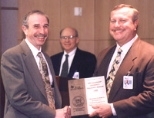CAMBRIDGE, Mass. -- MIT and two other research universities have received $1-million grants from Texas Instruments to establish a collaborative research network in advanced digital signal processing. The announcement was made last week.
The other members of the DSP Leadership Universities Program are Rice University and Georgia Tech. Each institution will receive $1 million over three years. Alan V. Oppenheim, Professor of Engineering, will oversee the project at MIT.
"The importance and impact of digital signal processing is clearly growing dramatically," Professor Oppenheim said, "because of exciting new algorithms and devices as well as an expanding array of applications."
TI Vice President Bob Hewes said that the Dallas company was "seeking to develop a unique synergy among leading DSP researchers, accelerating progress in areas of DSP applications and algorithm development." Mr. Hewes directs the company's Digital Signal Processing Solutions Research and Development Center.
DSP chips are the engines driving the digitization of electronics; the key component of such products as digital cell phones, voice recognition systems, intelligent telephones, short distance wireless, network switches, imaging and vision systems, medical electronics, digital audio, and sonar and radar operations. More powerful than CPUs (central processing units) of computers in handling math intensive tasks, DSP chips are found in anti-lock brakes and global positioning systems.






